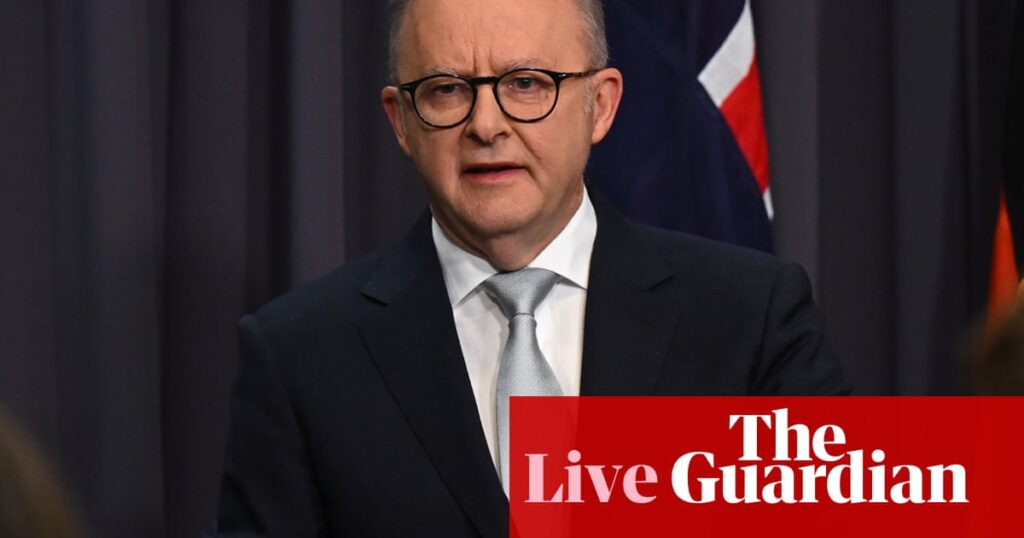PM welcomes Trump announcement of Iran-Israel ceasefire
Anthony Albanese has welcomed Donald Trump’s announcement earlier of a ceasefire between Israel and Iran, saying Australia had “consistently called for dialogue, diplomacy and de-escalation”.
The prime minister said in a statement:
The safety of Australians in the region is our priority.
We continue to closely monitor the situation in the Middle East and are deeply concerned about keeping Australians safe.
Trump claimed the ceasefire would take place in multiple steps: later today Iran will start the ceasefire, upon which Israel would then start its own ceasefire after Iran complies with the initial period. At the end of the 24th hour, Trump said, the conflict between the two countries would end. The US president said earlier:
On the assumption that everything works as it should, which it will, I would like to congratulate both Countries, Israel and Iran, on having the Stamina, Courage, and Intelligence to end, what should be called, “THE 12 DAY WAR.”
Key events
Bob Katter has brought penguins into geopolitics, saying that Australia’s defence fleet should be moved to Queensland and needs a hundred armed ships, at a “bare minimum”, to act as a deterrent to threats “in the north”.
The Kennedy MP said that he had last week spoken with deputy PM Richard Marles to push for the new amphibious army fleet to be moved to Cairns, rather than be based in Australia’s south.
“Unless we are going to be battling the penguins of Antarctica, maybe we should cast our eyes north to where the threat is more likely,” Katter said in a statement.
He said Australia had a “minuscule” air force and that its navy had “no serious armaments”.
He added:
A hundred ships. That’s your bare minimum. A hundred vessels loaded with serious missile systems and effective delivery mechanisms.
That’s what we need: a missile shield at sea, backed by onshore mobile artillery and a real guerrilla army on land.
Ben Doherty
Aukus vital to ‘deter Chinese aggression’, US lawmakers say, as Trump urged to recommit to submarine deal
The Aukus pact is vital to “deter Chinese aggression in the Indo-Pacific region”, Republican and Democrat lawmakers in the US have told the Pentagon, urging the US to recommit to the nuclear submarine deal with Australia and the UK.
The Trump administration announced this month it would undertake a 30-day review of the Aukus agreement – the deal struck in 2021 that would see US nuclear submarines sold to Australia and new-design nuclear-powered Aukus submarines built in the UK and Australia.
A letter addressed to the defence secretary, Pete Hegseth, signed by five Republican and Democrat lawmakers, urged the Pentagon to back Aukus, despite growing concerns over laggard shipbuilding in both the US and UK. The letter reads in part:
This is a defense alliance that is overwhelmingly in the best interest of all three Aukus nations, as well as the entire Indo-Pacific region.
Read more here:

Sarah Collard
Survey also finds uptick in First Nations people experiencing racism
The Australian Reconciliation Barometer also found an increase in First Nations people experiencing racism since the previous survey completed in 2022, with young Indigenous people experiencing the highest levels of racism.
Mundine said that there had been a stark increase in the past decade with 39% reporting experiencing racism in 2014 compared with 54% in 2024, noting:
More than half of Aboriginal and Torres Strait Islander people surveyed reported experiencing racial discrimination in the past six months. Not only has there been rise in these experiences since 2022 but we have seen a significant increase in racism in the last decade.
Of particular concern is that younger Aboriginal and Torres Strait Islander peoples experience racism at higher levels than all other age groups, with 68% of First Nations people aged 25-34 years old experiencing at least one form of racial prejudice in the past six months.
This exposure to racism has meant that half of the First Nations people surveyed feel unable to be true to their cultural identity in their community, in their dealings with government departments and in the criminal justice system.
This is a shocking finding and adds weight to calls for governments to fully implement the National Anti-Racism Framework, as a key established mechanism to address systemic racism in Australia.

Sarah Collard
Survey finds most believe relationship between Indigenous peoples and Australia important
A new survey finds 85% of respondents believe the relationship between Indigenous peoples and Australians is important, with strong support for reconciliation and truth-telling.
The Australian Reconciliation Barometer is conducted by Reconciliation Australia every two years to measure the attitudes and perceptions First Nations people and non-Indigenous Australians hold about each other and about key issues affecting Aboriginal and Torres Strait Islander people.
Reconciliation Australia CEO, Karen Mundine, said it was heartening to see the results after an often bruising campaign during the 2023 referendum debate. Mundine said:
The 2024 ARB results show that most Australians share an enduring optimism in the possibility of a more united Australia and believe that the Federal Government should do more to advance reconciliation.
It gives us hope to report that Australians now largely accept the truths of our history, place importance on our relationships with each other, and are prepared to work together.
The Barometer survey also found that multicultural Australians were more likely than non-culturally and linguistically diverse people to support truth-telling and reconciliation. It found that 81% of multicultural Australians support truth-telling compared to 67% and are more likely to believe the historical injustices must be addressed compared to other Australians with 36 % compared to 24% in favour.
Multicultural Australians believe in the importance of truth-telling at higher levels than Anglo-Australians (81% compared to 67%) and are more than twice as likely to have participated in a local truth-telling activity than Anglo-Australians.

Adam Morton
Victoria releases long-promised, but watered down, gas policy
The Victorian Labor government has released a long promised gas policy – its response to how the state will reduce use of the fossil fuel as supplies dwindle and it aims to reach net zero emissions by 2045.
Gas heating and hot water systems will be banned in all new homes and nearly all commercial buildings, with exceptions for agriculture and manufacturing. New constructions will have to use electric systems.
Rental properties including public housing will have to move to electric appliances when existing gas heaters and hot water systems reach the end of their lives. Until then, they are allowed to repair and maintain their existing gas systems.
Owner-occupiers will have to make a similar shift but – in a change from what was previously proposed – only for hot water systems. An earlier proposal that owner-occupiers could not install new gas heaters has been dropped.
Gas cooktops are not covered by the policy.
The changes for new buildings start on 1 January 2027. The changes for existing homes start on 1 March 2027. The government said it would help the state avoid gas shortfalls forecast by the Australian Energy Market Operator from 2029.
The premier, Jacinta Allan, said the policy would help cut energy bills by hundreds of dollars a year as electricity was cheaper than gas and ensure industry would “get the gas it needs”.
Energy and environment groups generally welcomed the policy as a positive shift that will cut bills and emissions, while arguing it could have gone further. The Australian Industry Group welcomed what it called a “pragmatic” policy.
The state Liberal opposition accused the government of engaging in a “war on gas”.
Coalition calls staffing reduction ‘vindictive and nasty’

Dan Jervis-Bardy
Guardian Australian understands Labor has also reduced its overall staffing numbers even after it secured a whopping 94 lower-house seats. Labor sources confirmed there would be a reduction in opposition and government staffing numbers but could not immediately provide specifics when contacted by Guardian Australia.
The shadow special minister for state, James McGrath, said Albanese’s decision was “vindictive and nasty” and an attack on “accountability”. McGrath said:
Given Labor’s historically significant majority, this arrogant decision to diminish opposition resourcing comes at his government’s most powerful electoral moment, which is precisely the time our country needs a strong opposition.
The Australian people deserve an opposition that is resourced appropriately to be able to hold the government to account, especially during such a precarious and challenging time for our country.

Dan Jervis-Bardy
Albanese reduces Coalition’s staffing numbers
Anthony Albanese has reduced the Coalition’s staffing numbers in a further blow to the opposition after its thumping election defeat.
More than seven weeks on from the May election, and with federal parliament to resume on 22 July, the opposition leader, Sussan Ley, received confirmation on Monday night of the Coalition’s staffing allocation for the new term. While the prime minister has discretion over staffing resources, the opposition is typically allocated 21% of the government’s headcount, according to Coalition sources.
The sources claimed Albanese has reduced their allocation to 17% of Labor’s share, resulting in the loss of roughly 20 roles, including 16 senior adviser positions.
The sources said Labor was claiming the cuts were proportional to the Coalition’s representation in parliament, which collapsed from 58 to 43 lower seats after the 3 May election.
The Coalition argues it still has the same sized shadow ministry (30 positions), which has the same workload and reliance on staff as before.
Drug for rarer types of cystic fibrosis to be listed on PBS, dropping cost from $250,000 a year to $31.60 a script
People living with rarer types of cystic fibrosis will pay a fraction of the price to access life-changing treatment under an expansion of the Pharmaceutical Benefits Scheme, AAP reports
The changes will take effect from July and mean the drug Trikafta will be affordable for patients diagnosed with rarer mutations of the disease, thanks to government subsidies.
Without subsidies, the treatment would cost an eye-watering $250,000 a year. People will now pay a maximum of $31.60 per script, or $7.70 if they hold a concession card. Almost 200 Australians every year are expected to benefit from the change to the PBS listing. The health minister, Mark Butler, said:
This expansion to Trikafta’s PBS listing is great news for hundreds of Australians who live with rare mutations of CF, including children, and their families. As a result, these people will be able to lead longer and better-quality lives.
New observatory releases its first photos of the universe
The first photos from a new telescope on the top of a mountain in Chile, the Vera C Rubin Observatory, were released today. The project, jointly funded by the US National Science Foundation and the US Department of Energy, is meant to usher in a new golden age of astronomy.
It’s named after Vera Rubin, the astronomer who “provided the first convincing evidence for the existence of dark matter”. The telescope is the first of its kind and includes the largest digital camera ever built, which will take detailed images of the southern hemisphere sky for 10 years to create “the largest astronomical movie of all time”. The observatory writes:
With Rubin data we will gain a better understanding of our universe, delve into the mysteries of dark energy and dark matter, and reveal answers to questions we have yet to imagine.

Josh Butler
YouTube should not be exempt from Australia’s under-16s social media ban, eSafety commissioner says
YouTube should be included in the ban on under-16s accessing social media, the nation’s online safety chief has said as she urges the Albanese government to rethink its decision to carve out the video sharing platform from new rules which apply to apps such as TikTok, Snapchat and Instagram.
The eSafety commissioner, Julie Inman Grant, also recommended the government update its under-16s social media ban to specifically address features such as stories, streaks and AI chatbots which can disproportionately pose risk to young people.
The under-16s ban will come into effect in December 2025, despite questions over how designated online platforms would verify users’ ages, and the government’s own age assurance trial reporting last week that current technology is not “guaranteed to be effective” and face-scanning tools have given incorrect results.
Read more here:
Andrew Hastie calls for more transparency on US-Australia military relations
Andrew Hastie, the shadow minister for home affairs, told the ABC there needs to be more “transparency” around the US military’s increased presence in Australia and what role the country could play in any US operations launched from its bases here.
Hastie, who supported the US bombing of nuclear sites in Iran, said as a miliary alliance grows between the US and Australia, “we need to know what freedom of action we have” and “we also need to know what limits there are as well”.
He told the ABC:
When America conducts combat operations, we want to know what our level of involvement will be.
I think if we’re going to have this close friendship going forward, it’s really important to understand exactly what that means.

Daisy Dumas
‘There are pissed off people everywhere’: dispatch from a traveller in Doha, Qatar
A New Zealand national who lives in Sydney says her flight from Doha was one minute from boarding when Qatar Airways announced the airspace had been closed.
“No one mentioned the missiles. I don’t think people realised how close the rockets were,” the Qatar passenger, who asked for her name to be withheld, told Guardian Australia.
She had travelled from Edinburgh to Doha and was waiting for her connecting flight to Sydney to be rescheduled, saying:
The airspace has reopened but it’s chaotic as about five hours of flights need to be rescheduled.
She said other travellers appeared visibly exhausted.
There are pissed off people everywhere and there are no updates on what’s happening. People are now really upset as they feel uninformed and not supported.
There are no hotels, blankets or updates available, staff are overrun at help desks.
She said the airport’s 24/7 shops and cafes were operating as usual.


